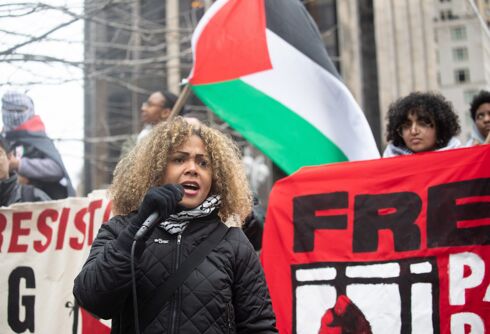I never understood why we are taught that heterosexual people have lives, but LGBTQ+ people have so-called “lifestyles.”
• What is the LGBTQ+ LIFESTYLE?
• Is there only one LGBTQ+ LIFESTYLE or are there many?
• Does it have to do with the LGBTQ+ AGENDA?
Dive deeper every day
Join our newsletter for thought-provoking commentary that goes beyond the surface of LGBTQ+ issues
Related:
Former student describes brutal culture of anti-LGBTQ+ bullying at Nex Benedict’s high school
The student echoed what many others have said: Owasso High School officials see bullying and do nothing about it.
But wait, I know how to find the answers to all of my questions. I will ask the wise knowledgeable members of the school board in the Cumberland Valley School District in Pennsylvania, who canceled a scheduled talk to students at their Mountain View Middle School in Mechanicsburg, Pennsylvania, on May 22 over issues of the speaker’s “lifestyle” and “activism.”
30 Rock actor and children’s book author Maulik Pancholy has been active in anti-bullying school campaigns throughout the nation. His two award-winning children’s books, The Best at It and Nikhil Out Loud, focus on themes of anti-bullying and empathy. In addition to his popular role 30 Rock, he is also known for voicing Baljeet in the cartoon Phineas and Ferb.
During the school board meeting at which members discussed whether to cancel Pancholy’s talk, they raised concerns about what he might discuss and whether he would mention themes in his books.
“He labels himself as an activist, he is proud of his lifestyle, and I don’t think that should be imposed upon our students at any age,” school board member Bud Shaffner said during the meeting.
Board member Kelly Potteiger affirmed Shaffner’s concerns about Pancholy discussing his “lifestyle.”
“He did say that’s not the topic but that’s what his books are about, and he will probably talk about his pathway, because he talks about anti-bullying, and empathy and inclusion so part of that is his journey,” Potteiger said. “That’s where, as a self-proclaimed activist, that’s where it gets concerning, I think.”
So, a “lifestyle” and “activism” centering on “anti-bullying, and empathy and inclusion” brings up so much anxiety and fear of inappropriateness for middle school-aged students that the school board voted unanimously to cancel Pancholy’s talk.
School parent Trisha Comstock, whose two sons attended Mountain View Middle School and who now attend the district high school, started a petition that garnered thousands of signatures asking that the board reverse its decision.
“As a member of the Cumberland Valley School District community, I am deeply saddened by the Cumberland Valley School Board’s decision to cancel an assembly scheduled at Mountain View Middle School…” Comstock wrote.
“Being LGBTQ+ isn’t a dirty little secret to protect our students from. To have someone with Maulik’s life experiences would have been inspirational for our students. It is important that we teach our children about diversity and acceptance from an early age. According to a study by GLSEN (Gay, Lesbian & Straight Education Network), schools that promote LGBTQ+ inclusivity see better academic outcomes and lower rates of bullying.”
Pancholy posted a statement to Instagram thanking the community for their “outpouring of solidarity, love, and support.”
“When I visit schools, my ‘activism’ is to let all young people know that they’re seen. To let them know that they matter,” he said. “When I talk about the characters in my books feeling ‘different,’ I’m always surprised by how many young people raise their hands – regardless of their identities and backgrounds – wanting to share about the ways in which they, too, feel different,” Pancholy wrote. “That’s the power of books. They build empathy. I wonder why a school board is so afraid of that?”
In this case, the power of the public outcry over the Cumberland Valley School District’s initial decision won out when the board voted in a 5-4 decision on April 24 to reinvite Pancholy to speak at the school during a May 22 assembly. The board heard further testimony from several local residents, including over a dozen students from Mountain View Middle School.
Freedom to hate?
Controversy has also been swirling around the University of Southern California’s decision to revoke all commencement speakers at its upcoming graduation events after the university canceled a speech by its valedictorian, Asna Tabassum, a senior from Chino Hills with a major in biomedical engineering and a minor in resistance to genocide.
Tabassum is a first-generation South Asian American Muslim. University officials cited concerns for public safety to justify their decision after viewing some of her media posts supporting Palestinian rights and liberation.
“To keep the focus on our graduates, we are redesigning the commencement program,” declared the official university response. “Given the highly publicized circumstances surrounding our main-stage commencement program, university leadership has decided it is best to release our outside speakers and honorees from attending this year’s ceremony.”
Tabassum’s Instagram account links to a slideshow encouraging people to “learn about what’s happening in palestine, and how to help,” NBC News reported. It calls for “one palestinian state,” which it says “would mean palestinian liberation, and the complete abolishment of the state of israel.”
“As your class valedictorian, I implore my USC classmates to think outside the box — to work towards a world where cries for equality and human dignity are not manipulated to be expressions of hatred,” Tabassum said in a statement.
The First Amendment of the Constitution states, “Congress shall make no law respecting an establishment of religion, or prohibiting the free exercise thereof; or abridging the freedom of speech, or of the press; or the right of the people peaceably to assemble, and to petition the Government for a redress of grievances.”
But how do we define “hate speech”? And does the First Amendment protect the right of hate groups to speak and publish their ideas, to assemble, and “to petition the Government for a redress of grievances”?
In some countries without a First Amendment equivalent, the answer is no.
In Britain, for example, though people have a general right to speak freely and associate with whom they wish, these rights exist to a lesser degree through common law and legislation than in the United States.
A responsibility in common law is to protect “the King’s peace” or “Queen’s peace” and to arrest anyone who transgresses. In addition, Public Order Act 1936 passed by Parliament in the 1930s forbids wearing “political uniforms” at public meetings when they represent a political object. This law was enacted to control extremist movements, such as fascists.
The First Amendment guarantees that we may never place a demarcation line between “free speech” and “hate speech” due to the enormity in constructing the boundaries –until and unless the judiciary develops clear and consistent demarcation lines between the two.
We certainly don’t have to support disgusting rhetoric and ideas, but people and groups have the right to speak and peacefully protest.
Before organizations cancel speakers, they need to at least provide direction on what is appropriate for their audiences. They need to emphasize that speakers must be sensitive to present topics in an age-appropriate manner.
Yes, the cases of Pancholy and Tabassum are very different, but both are deeply impacted by what has come to be called “cancel culture,” a primarily right-wing political tactic to silence progressive ideas.
Should the administration of the University of California at Berkeley have canceled Milo Yiannopoulos and Ann Coulter’s planned addresses in 2017? While most students engaged in legally-protected peaceful protests, was it appropriate for some protestors to contribute to violence in opposing the appearance of these controversial speakers – most notably at the university serving as the epicenter of the “Free Speech Movement” during the early 1960s?
It is true that a valedictorian speech at graduation ceremonies and attending an open campus address are very different venues since the latter is completely voluntary. But, we must also ask ourselves, if not on a university campus, then where can we engage in controversial topics and ensure the rights of others across the spectrum to pose their ideas?
In addition, should students have the right to peacefully protest on a university campus without fear of being arrested and suspended?
Regardless, I’m still confused about why heterosexual people are said to have lives and LGBTQ+ people have lifestyles. Those Pennsylvania school board members seem even more confused than me.
Don't forget to share:
















Who should have the right to speak their mind?